- News
- Reviews
- Bikes
- Accessories
- Accessories - misc
- Computer mounts
- Bags
- Bar ends
- Bike bags & cases
- Bottle cages
- Bottles
- Cameras
- Car racks
- Child seats
- Computers
- Glasses
- GPS units
- Helmets
- Lights - front
- Lights - rear
- Lights - sets
- Locks
- Mirrors
- Mudguards
- Racks
- Pumps & CO2 inflators
- Puncture kits
- Reflectives
- Smart watches
- Stands and racks
- Trailers
- Clothing
- Components
- Bar tape & grips
- Bottom brackets
- Brake & gear cables
- Brake & STI levers
- Brake pads & spares
- Brakes
- Cassettes & freewheels
- Chains
- Chainsets & chainrings
- Derailleurs - front
- Derailleurs - rear
- Forks
- Gear levers & shifters
- Groupsets
- Handlebars & extensions
- Headsets
- Hubs
- Inner tubes
- Pedals
- Quick releases & skewers
- Saddles
- Seatposts
- Stems
- Wheels
- Tyres
- Health, fitness and nutrition
- Tools and workshop
- Miscellaneous
- Buyers Guides
- Features
- Forum
- Recommends
- Podcast
TECH NEWS
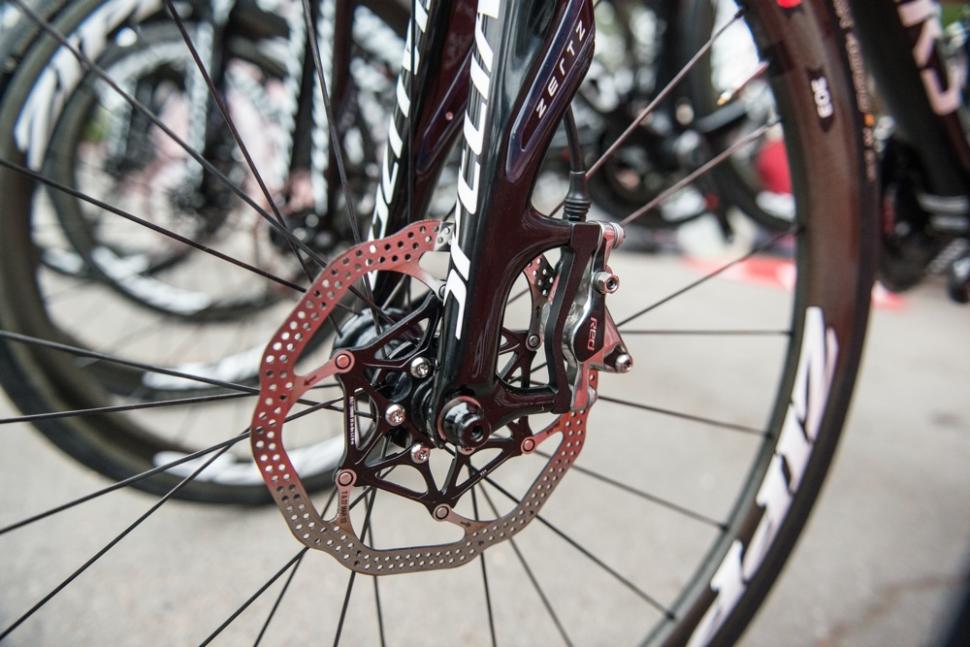 SRAM HRD disc action 2
SRAM HRD disc action 2Why SRAM believe hydraulic brakes are the future
SRAM confirmed a few months ago that they were working on new hydraulic brakes for the road and they’ve now gone public with their new designs, one operating on the wheel rim and one disc version.
Hydraulic brakes have featured in mountain biking for some time and they’re now making headway in the road market too. A year ago, Cervélo specced Magura’s new RT8 TT hydraulic rim brakes on their P5 time trial bike and Team Garmin-Sharp riders have used the same brakes on their road bikes on many occasions. Plus, leaked photos have shown that Shimano are working on hydraulic discs too.
We sat SRAM’s Product Manager Paul Kantor down and asked him about the development of their new designs…
So SRAM are finally launching the long-awaited hydraulic brakes. What’s the thought behind the new designs?
We liked the idea conceptually of putting disc brakes on road bikes but we didn’t know if they’d ride well and be any improvement on what we already had, so we made a hydraulic coupler [built into a stem] to standard mechanical levers, put it on a steel cyclocross frame and used it for four or five months.
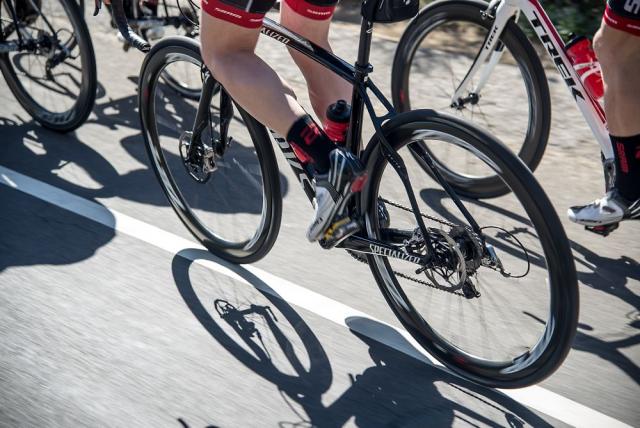
I used to commute to and from work everyday with it and took it on my weekend rides and established that disc brakes lived up to the advantages that we had in mind. But the coupler was ugly and couldn’t be made shorter than 110mm so we shelved that idea and said that the system had to be fully integrated.
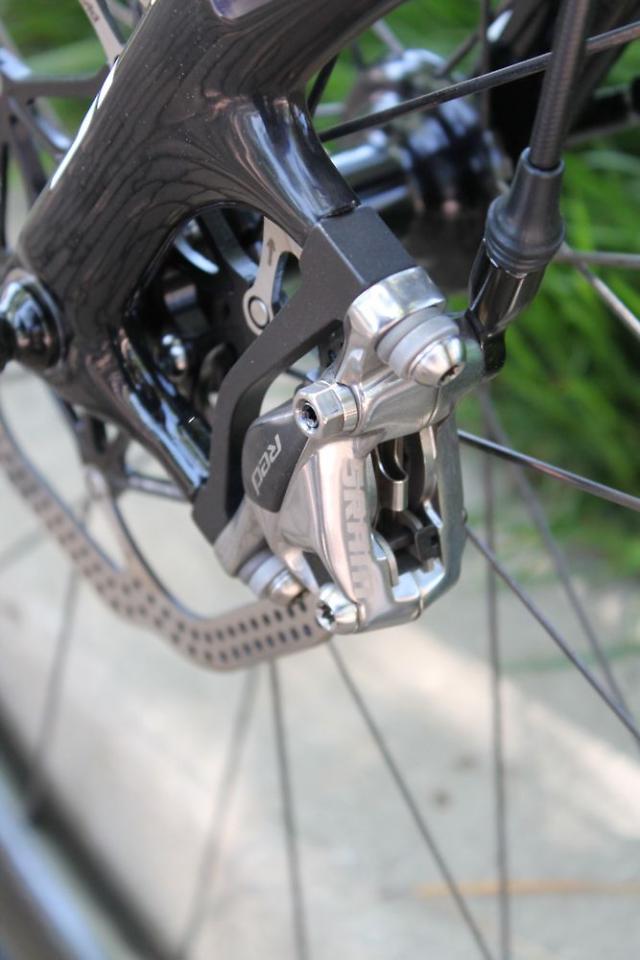
We spent a lot of time working out whether the smaller contact patch between a road bike tyre and the road [compared to a mountain bike tyre and the trail] makes a prohibitive difference. We quickly decided that we liked the idea and got to work on the engineering principles and on additional testing in the real world.
People often say that, when it comes to road bikes, it’s not stopping the wheel that’s the problem but preventing the tyre from sliding on the road when you brake hard. What would you say to that?
That’s not incorrect. There’s definitely some truth in that. I can certainly lock up my wheel with a carbon rim and a mechanical rim brake, but if I do that I’m still just sliding down the road and that sucks. Locking up the wheel isn’t hard but if that were our goal we’d just sell you a stick that you could ram in there and you’d be done!
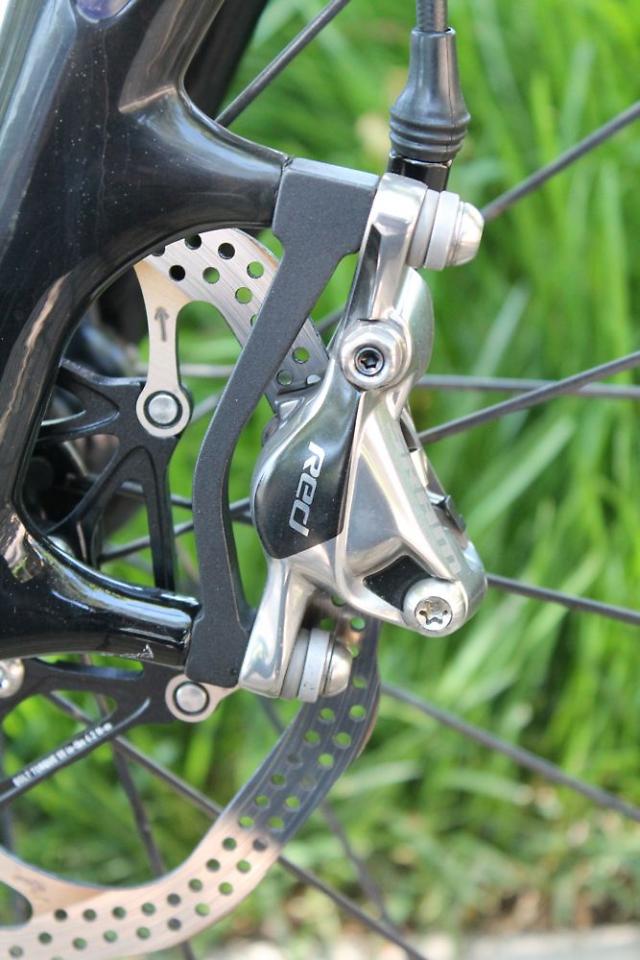
Everything we’ve focused on is prior to locking up the wheel. We’d argue that with both of these hydraulic systems you can take off more speed with greater control prior to locking up the wheel. Some people refer to that as ‘modulation’. That’s a term we don’t really care for, but it’s fine. We’re really talking about decelerating substantially without locking up the wheel. Beyond that you get into tyre/Tarmac territory and that’s not where we at SRAM operate.
With the hydraulic rim brakes feeling so powerful for such little effort at the lever, why would people want to go for disc brakes on the road?
Our hydraulic disc brake has a higher braking force at every lever force than a mechanical brake on an aluminium or a carbon rim, and more than our hydraulic rim brake. You can provide quite a bit more force for less hand effort and that’s really what we like most about hydraulics.
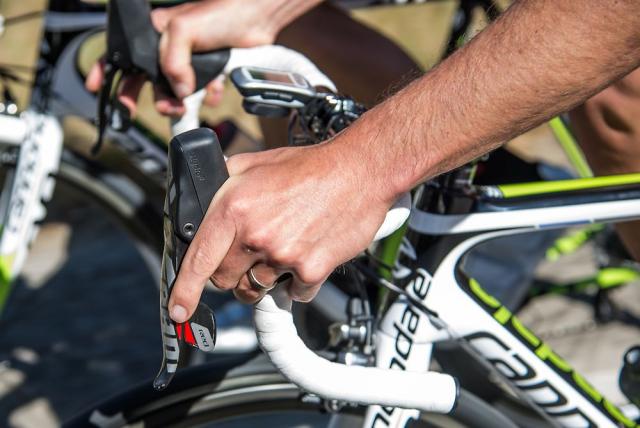
We think that Red mechanical and Shimano Dura-Ace mechanical brakes are pretty comparable, but with a hydraulic rim brake you are able to exceed that braking performance. On a disc brake we can create even more force for the same lever effort. It’s much more consistent wet and dry too because we are braking on a steel rotor that’s consistent time and time again. That’s really where discs come into their own.

CEN [European Commettee for Standardization] requires that there’s not more than a 20% drop off between wet and dry on a rim brake and we improve that substantially on a disc brake. It’s more like a drop off of 5-8% in bad conditions. Plus, it’s a sealed system that’s consistent over time.
You can run a rim brake engaged at about 550W for 6mins and you’ll burst the tyre. Admittedly, you don’t see that a lot out in the field, but you do see it. You can run a disc brake at 900W for 11mins and the brake doesn’t boil and the tyre doesn’t burst.
Once you start adding up all these testing elements you start to see more and more opportunity for a disc brake to exceed what’s already out there.
So why not just go for discs, then?
There are millions of bikes in the market that have single-bolt caliper brakes. The rim brake allows someone to take their two year old Colnago and bolt on some new technology and move things forward, so that serves the existing customer.
We really like the way the rim brakes ride and we’re all about choice too. We like to put a couple of good options out there to allow the customer to choose what they want.
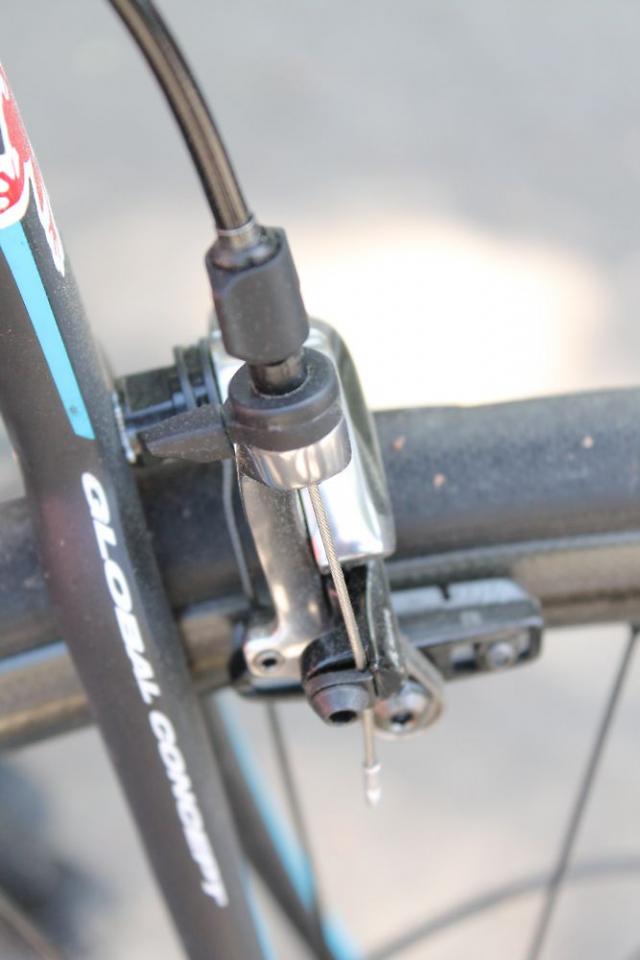
We may find eventually that hydraulic rim brakes do win out over hydraulic disc brakes, although I don’t think that’s going to be the case. I don’t think that discs will kill the rim brake, I think we’ll see the two options, but I do think that mechanical cable-operated brakes will go away.
People are sometimes worried that disc brakes will overheat and fade. Did you have to do a lot of work to make sure that doesn’t happen?
Where you might have trouble is with some big guy riding down the Stelvio for 45mins dragging the brake, and we were worried that we’d have boiling issues there. But what happens is that the brake reaches a steady state where the heat isn’t increasing. It really wasn’t an issue.
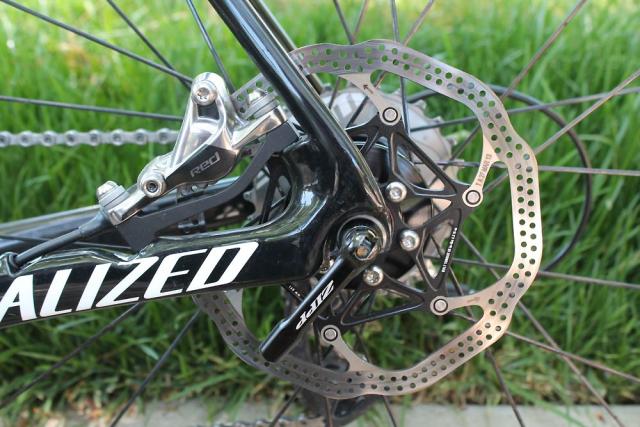
To prove that, we put a pressure transducer in the line and took brake temperatures – so we were measuring the brake temperature relative to the pressure – and hooked it all up to a computer. We never boiled the system.
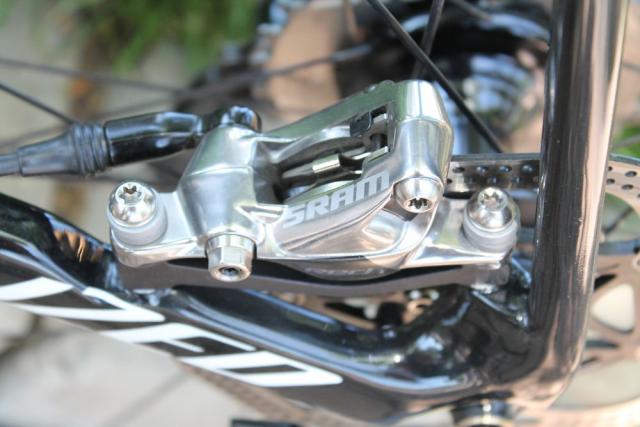
What we did see is that when we decelerated from 50-60kph down to 15kph in 1-2sec increments on a switchback descent there was friction fade where you’d lose some of your coefficient of friction in the pad. That is much better than having the system boil.
We could induce this on a 140mm rotor so we went away from an aluminium backing surface on the pad and moved to stainless steel which dissipates that heat way better. So now we have a very small window where you could induce some friction fade if you were really trying to do it but we have had next to no issues with boiling the system. We were really surprised.
So, how do we decide between 140mm and 160mm rotors?
We recommend 160mm rotors front and rear for road use and 140mm is fine for cyclocross. We have tested 140s extensively but we like the margin of safety that 160s offer for the road.

What brake fluid do you use?
We use DOT 5.1 fluid, which has the highest boiling point of any DOT fluid. Making it is highly regulated so it’s consistent around the world, which we like. It means that if you bleed your brake in Thailand the fluid is going to be the same as if you did it in New Zealand.
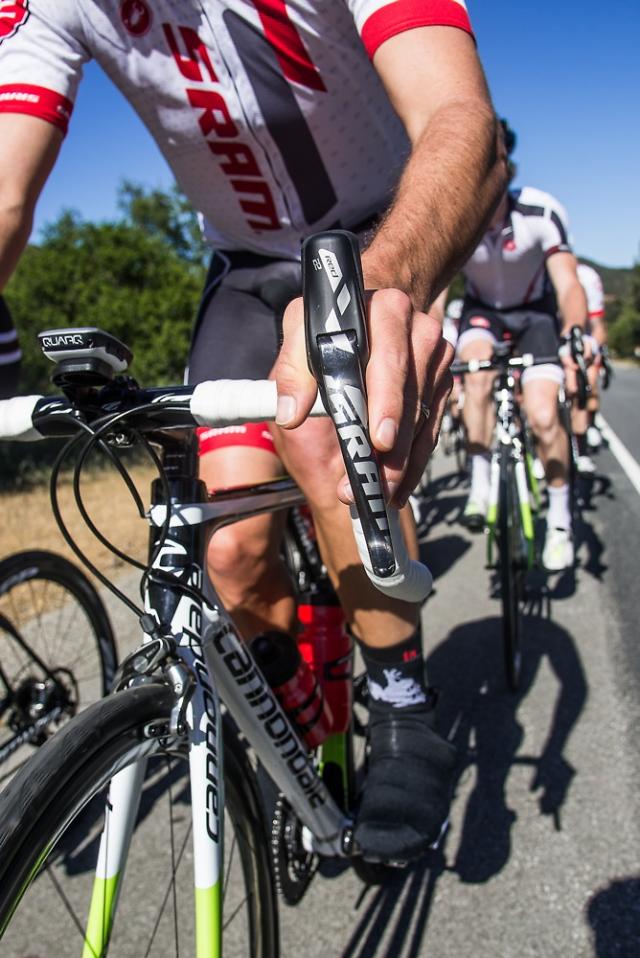
Do you see any benefit in further developing mechanical disc brakes for the road?
We made the mechanical road brake [at Avid] 10 years ago and it was so far ahead at the time that there were no bikes for it. I think that a good mid-price mechanical has a home. Some people just like the cables so I think there’s a place for that.
Hydraulic disc brakes will come down in price over the next 3-4 years to a 105/Rival level. Then we’ll have to decide whether to make a fancy mechanical disc brake or whether we can push the hydraulic technology down further. That’s undecided right now. We have to see how the market reacts.
For more info on SRAM's new hydraulic brakes go to our story on the complete new groupsets.
Mat has been in cycling media since 1996, on titles including BikeRadar, Total Bike, Total Mountain Bike, What Mountain Bike and Mountain Biking UK, and he has been editor of 220 Triathlon and Cycling Plus. Mat has been road.cc technical editor for over a decade, testing bikes, fettling the latest kit, and trying out the most up-to-the-minute clothing. He has won his category in Ironman UK 70.3 and finished on the podium in both marathons he has run. Mat is a Cambridge graduate who did a post-grad in magazine journalism, and he is a winner of the Cycling Media Award for Specialist Online Writer. Now over 50, he's riding road and gravel bikes most days for fun and fitness rather than training for competitions.
Latest Comments
- brooksby 1 hour 24 min ago
They haven't been seen for ages- did they get banned?
- eburtthebike 1 hour 30 min ago
They prefer their alternative facts to real ones. They believe something, therefore it must be true.
- Spangly Shiny 2 hours 41 min ago
Sorry, no idea what you are on about.
- ktache 2 hours 44 min ago
For double that you can' get a Pedro's vise whip Ii. Or half, the reportedly excellent decathlon thingy. And Sigma has the Silca for only £150.
- KDee 2 hours 50 min ago
I'm no detective, but the "NOAHFAST" decal vertically stickered on the headtube is a little bit of a clue.
- Spangly Shiny 3 hours 10 min ago
I remember my driving test examiner, straight after congratulating me for having passed the test said, "Don't be a twat and have that as your best...
- Bigfoz 5 hours 18 min ago
Did they think it was a drive thru?
- Rendel Harris 5 hours 28 min ago
As a teacher's husband, I'm allowed to watch up to 50km out (unless it's a big mountain stage when I can only watch up to the start of the first HC...
- PoorInRichfield 8 hours 3 min ago
I thought wide rims and tires were marketing hype until I bought a bike in 2019 that had both... 700x32C tires on a 25mm internal width rim. Now I...
Add new comment
28 comments
I know that the current consensus is that the UCI has banned disc brakes in road races, but as far as I can tell, there is nothing in the rulebook prohibiting their use. Indeed the only reference to disc brakes in the equipment rules for road, track and CX explicitly permits their use in CX, without specifying any regulations for their use on the road. The only thing I can see that comes close to prohibiting them on the road is rule 1.3.004, which prohibits ‘technical innovations’ outside of MTB. However, the rule states that “[t]here is no technical innovation [...] if the innovation falls entirely within the specifications foreseen in the regulations,” which is undoubtedly the case with disc brakes, as they are referred to in rule 1.3.004! I would dearly love to see a pro team have a go at running some disc brakes and watch the UCI try to find the rule which supposedly prevents them from doing so.
In response to Bigfoz:
Forks won't have to be stronger. The braking force will be about the same, and the moment is applied at the axle whatever you use for brakes (disk, rim, hub, whatever). The moment arm is the same (bottom of steerer to axle) in each case and the forces are the momentum of bike and rider (acting forwards at the steerer) and the resistance of the road (acting backwards at the tyre/road junction) and thus transferred via the wheel to the axle.
So to sum up, the fork needn't be strengthened, though it will need a bracket to carry the brake caliper.
Plus a few on hydro rim brakes.
Anyone remember crushing side walls of rims with old magura
brakes on mtb's in the early 90's.
What would be "interesting" is when half the pro peleton are on hydraulic disks and half on cable rim brakes.
Wouldn't you need to beef up certain parts of the bike?
Forks both at the bottom (to take calipers etc) and also the top (breaking force will move a long way unsupported from the pivot where it currently sits - pretty sure Archimedes or someone had a law about that...)
Rear triangle same - and will beefing that up take feel out of the rear end of the bike, like having fat chunky stays?
Also, the brake loads will route through the spokes as they're directly applied to something bolted to the hub - won't that mean higher count of fatter spokes?
Are modern carbon bikes now so light that you can add fat back in and still come under the ludicrous UCI Weight limit?
For me they have both advantages and disadvantages. Having bled brakes on cars and motorbikes, I'll stick with the simplicity of cable operated rim brakes. In almost 50 years of riding and 40 years of racing they've never let me down, nor cooked a tyre off the rim.
My commuter bike is drop handlebar and disc brakes- currently on Avid BB7s, but I'd certainly be interested in a sensibly priced hyraulic option and I don't like the look of convertor type systems, so the levers finally being a thing really interests me.
Hmmm Hydraulic Disk Brakes ... complicated? More Weight? Expensive? Is there really an advantage here for the average rider??
Oh and will we have to have Brake Lights???
For my budget this falls under the "electronic gear change" systems ... Too expensive & too complicated just an excuse for manufacturers to make more money in a self created market!
Oh God ranting again
Sticking with the pro peloton, as some of us like what the pros ride, do you guys think the pros want discs or hydro rim brakes?
Just thinking in terms of wheel changes, etc.
Disc pads can be harder to avoid rubbing than on a rim brake during a quick change for eg.
You shouldnt have rubbing on disc pads unless you put the wheel in wrong, but anyway, I read in an article on another site they designed the pads to sit further from the disc rotor to accommodate the flex of skinny road forks/stays during hard efforts.
Cool. That makes sense to have a bit more room, although I wouldn't imagine loads of flex on pro bikes.
Not so much putting wheel in wrong but not lined up perfectly and it'll brush!
Shouldn't be a problem with modern hydraulic systems, they basically self-centre - assuming you don't completely screw up putting the wheel in, that is.
I'd have thought the pros would want discs for the long mountain stages, particularly the ones with big descents or if rain is forecast. Give it a couple of years, and I won't be surprised to see all but the TT stages using disc equipped bikes, the clear advantages and (very) few disadvantages mean rim brakes will slowly but surely disappear.
And personal peeve about threads whenever this topic comes up: "decent" is not the same as "descent"
I would agree that the consumer market and pro market is becoming ever more detached. How most bikes are made or designed is going to have less and less to do with UCI regs. Unless sportives etc start following the regs there will not be a reason to hold back innovation even of top end bikes. Just look at the non UCI tri trial bikes. I don't care if the pro's cannot ride discs. I know that my ultegra road bike under-performs compared to my slick tyred 29er on braking in all conditions - particulalry on a commute, drafting a bus, going downhill and in anything beyond damp.
I want my next bike to have hydraulic disc brakes and electronic shifting so I can put on carbon wheels that don't overheat and won't wear out. I Want to know that any decents I make on unclosed roads allow me to stop as quick and safely as possible if a car/ped comes the other way. And I am willing to pay for this irrespective of what a pro rides.
I'd think that stainless steel is better as the backing because it's a worse conductor than aluminum, so that the pistons and the fluid stay cooler than if the pad conducts more heat from the disc into the piston.
Any idea about the weight of the system? Do the frames and forks need reinforcing?
And I'm surprised that there are no disc-specific rims - I'd think that you could take material out of the rim if you don't need to use it to brake with.
The forks are certainly reinforced, and the frames would have to be too - on most MTBs you can see extra material or a reinforcing strut around the rear brake.
And I am also surprised at the lack of disk-specific rims appearing - although I'm sure it's only a matter of time. I don't think the weight savings would be enormous (just the extra amount that manufacturers build into their rims to account for brake track wear), but the aero shaping possibilities could be interesting.
After admiring the disk-equipped Specialized Roubaix on the pics associated with the launch article I discovered that Specialized actually already sell a disk-equipped version of the Roubaix - albeit a mechanical versioned one. That is equipped with a DTSwiss disk-specific wheelset called the 'Axis 4.0 Disk', but that is not listed on the DTSwiss website - presumably an OEM product only as it stands. The non-disk version of those wheels didn't get a good reception when Cycling Weekly reviewed the non-disk version of that bike in January. http://www.cyclingweekly.co.uk/tech/bikes/129512/1/specialized-roubaix-e...
The pics on the Specialized website show the bike with a very tasty looking set of in-house Roval CLX 40 Disk wheels. These were launched last summer, but I don't see them for sale anywhere yet: http://velonews.competitor.com/2012/07/bikes-and-tech/specialized-debuts...
Personally, I'm looking forward to seeing the Shimano hydraulic disks, as I suspect they'll be the first to couple them with electronic shifting. Logic says that they'd launch them as an addition to the existing Dura Ace group, but Ultegra 6700 has been round almost 4 years now, so it's not beyond the realms of possibility that they'll use a new version of their second-tier groupset as a platform for the launch. I'm sure something must be in the pipeline.
The road bike market is so much greater than racers now that most manufacturers can more-or-less ignore the UCI regs for some models as far as disks are concerned. It's obviously expensive to produce 2 versions of a frame/fork, so I wouldn't expect to see a disk version of every high-end model next year, but I'd be very surprised if most manufacturers aren't offering a disk option on their fast sportive / classics models for 2014 - GF01, Roubaix, Domane, Synapse, Fenix, Defy, etc.
I would have thought a major benefit of disk brakes is that your wheels will last much longer without the physical interaction between brake pads and rims, therefore you can arguably go for a better wheelset as it will last you longer. Am I wrong here?
Does that make anyone else nervous? 'Next to no issues' is so much less reassuring than 'absolutely no issues' when contemplating decelarating 18 stone of bike and kitted up rider on a long 1 in 10 descent at over 40mph.
No: "next to no issues" means they've tested the system to breaking point (forgive the pun...) and beyond - they've found any potential pitfalls and fixed them. Changing the material on the backing plates for example.
Bottom line is it's tried and tested technology; dic brakes have been used on cars and MTBs for decades so all that really needs doing is to make them lighter and integrate the workings to a normal shifter unit.
This is the exact reason I'm interested. Zero rim wear means a posh set of wheels will last indefinitely.....and one set year round, great!
So now we have sets of realistic hydraulics for road bikes, how many road frames are going to be available to fit the disc options to? Or do we have to wait another year. The C59 and....
To be honest, the limited number of frames is not the issue, it's the UCI. You can bet that every major manufacturer has been waiting for this point for the last 2 years and they're basically ready to go with disc-ready frames.
The problem at the moment is you can't do a road race on any of them! While for your average Sportive riders that's probably not an issue, it is a problem for those who do race and also for the frame manufacturers who (rightly) see events like the Tour as a proving ground for new tech.
Although SRAM have just released information on their new groupsets to the public, they've been sharing it within the bike industry for some time so that other manufacturers can prepare. As well as the road bikes that are already disc compatible, others are sure to be released in the 2014 line ups.
I'm not sure how discs will fit in with the general trend of making everything on a road bike more Aero. I suspect manufacturers will be more drawn to the rim brake
Now we just wait to see how long the UCI spend batting 'disc brake or no disc brake' around. good to see SRAM developing the tech - be even better when costs get down to those of MTB systems.
Yep, I am sure that's what Paul said. I have the recording right here on my desktop.
Agree with his dislike of the term 'modulation', which implies a cyclic variation in brake force. The characteristic that improves with better brakes is actually the 'granularity', ie. The number of specific efforts which can be applied with a commensurate variation in braking force. This has echoes in audio sampling bit rate.
I've heard the term "Modulation" used too but always assumed the speaker actually meant to say "moderation" with regard to gaining greater control and removing extremes of braking.
Interesting. Don't understand why they'd switch from alu to stainless for pad backing material, though, in the name of better heat dissipation.
You sure you wrote that down right, Mat?
http://www.engineeringtoolbox.com/thermal-conductivity-metals-d_858.html